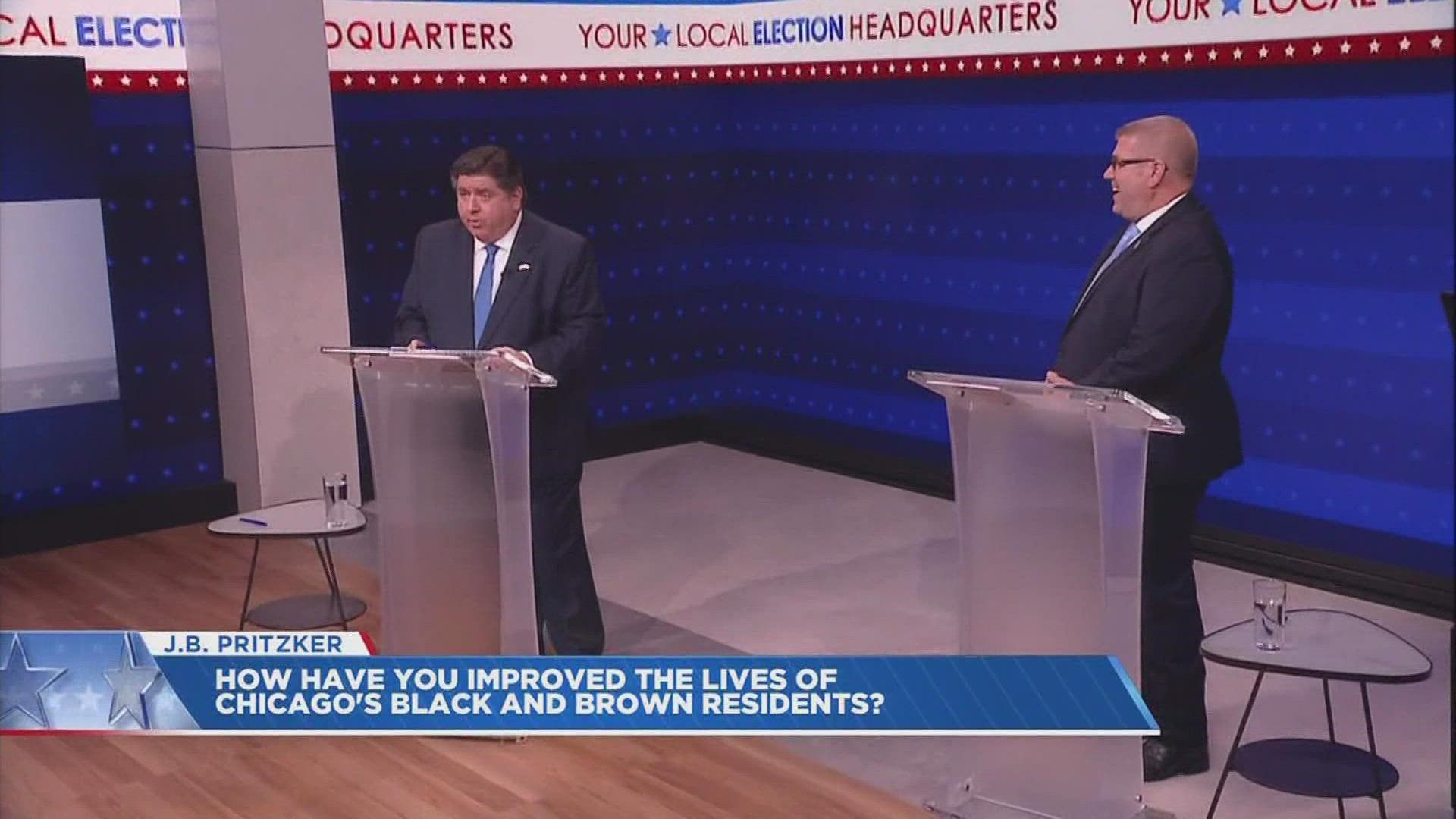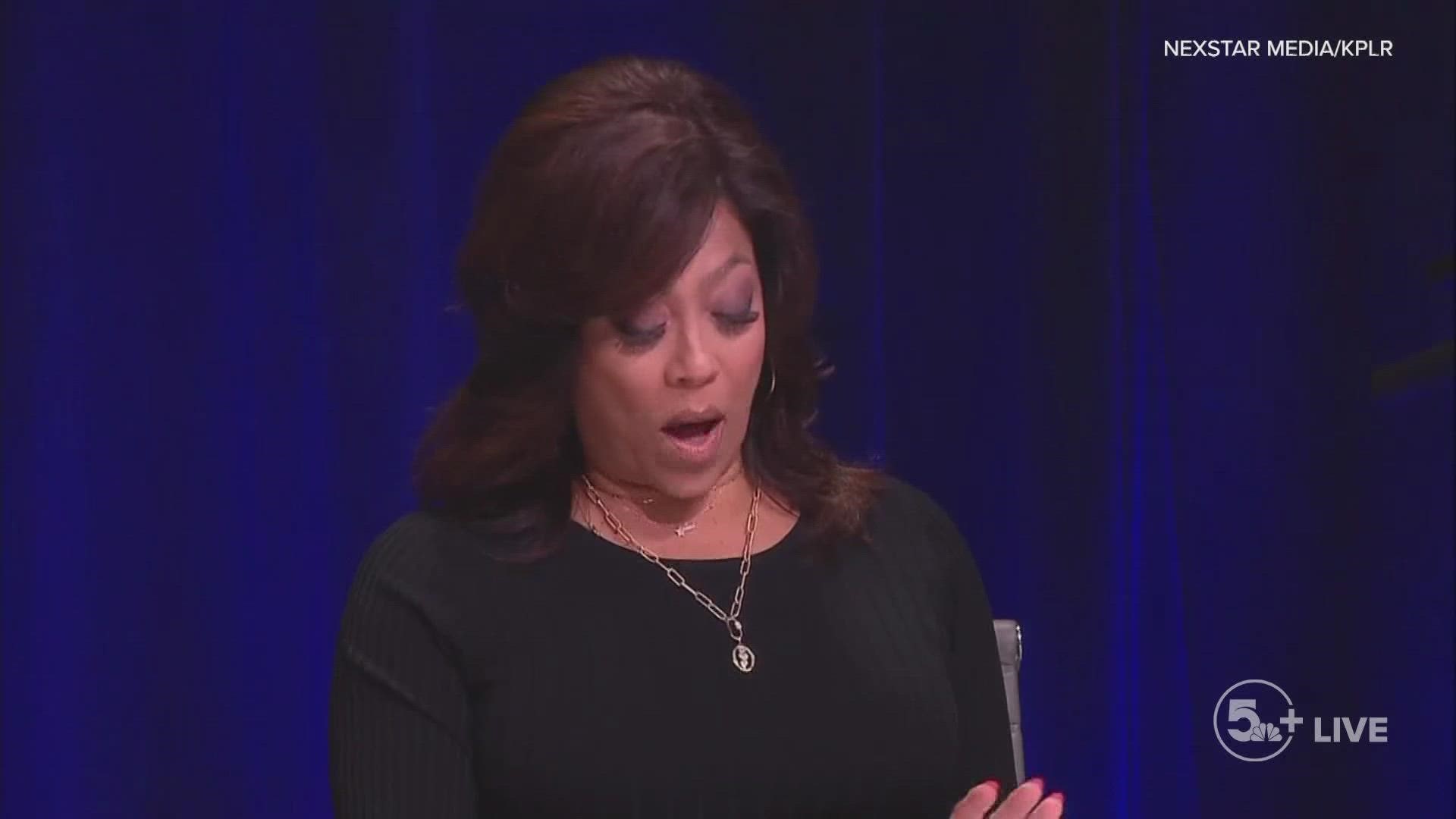ILLINOIS, USA — Illinois Governor J.B. Pritzker and Republican challenger Darren Bailey squared off in their final debate in Chicago on Tuesday night. The hour-long contest featured a barrage of insults, interruptions and heated exchanges over race and gender-related curriculum in the classroom.
Early in the debate, moderators pressed Bailey, a State Senator from downstate Louisville, to explain specific steps he would take in office to combat violent crime in Chicago. Instead of offering policy proposals, he lobbed insults and blame.
"I've got a new name for Chicago. I'm gonna call it Pritzkerville," Bailey said. "Chicago is the nightmare called Pritzkerville."
The closest thing Bailey offered to a specific plan was to "let the people know that help is on the way and things can be better."
"I want to point out that Darren Bailey just showed you that he has no plan to address crime in Chicago," Pritzker responded. "He wants to throw Chicago out of Illinois, calls it a hellhole."
"During COVID, we saw crime increase substantially all across the nation. I take that very seriously," Pritzker said. "That's why I increased the number of state police; why we built state-of-the-art crime labs; we eliminated the state's rape kit backlog, funded Violence Intervention programs, youth job programs and mental health and substance abuse treatment. Look, Darren Bailey voted against all of that. He has no plan. He's presented no plan, and complaining is not a solution."
Later, moderators asked Bailey what Black Lives Matter means to him.
"It means that every life matters," he said. "And unfortunately, J.B. Pritzker, during his four years in office has created so much division and hate in this state with racial ideas and ideology."
A debate moderator pressed Bailey to provide a specific example of Pritzker advancing a racial ideology, but the senator's response redirected back to the 2020 crime surge.
"Well... the simple fact that this all started when he didn't control the crime in the early days of the corruption and some of the stuff that was taking place in Chicago," Bailey said.
After the police murder of George Floyd in the summer of 2020 and the national uprising of protest and unrest that followed, the Illinois Legislative Black Caucus vowed to turn that protest into meaningful policy. They drafted the SAFE-T Act and said it would confront systemic racism in the criminal justice system. Pritzker signed it into law in January 2021.
Pritzker, who has faced intense criticism over aspects of the law that abolish cash bail, defended the underlying principle behind the new law.
"The folks who are critical of the SAFE-T Act, and who are spreading disinformation, want to let violent criminals out of jail on Jan. 1," Pritzker said. "That's not what the Safety Act says. But if they're going to try to do that, we ought to amend the SAFE-T Act to make sure they can't do it. Let's amend it but not end it. And Darren Bailey is defending a system currently that allows people to buy their way out of prison."
The incumbent governor, who was far more assertive and aggressive than he was during their first debate, held nothing back in his criticism of his Republican opponent.
"Bailey has surrounded himself with racist, misogynistic, homophobic, xenophobic people and organizations, including chasing after the chief among them, Donald Trump," Pritzker said.
Later in the debate, candidates shifted their focus from race in public policy to race in the classroom curriculum.
"[Bailey] shouldn't be led anywhere near education policy or education funding," Pritzker said. "He runs a school that teaches kids that women are inferior to men, that slave owners were good to their slaves."
"Oh, Governor Pritzker, now that's too far," Bailey interrupted.
"I'm not going to tell you again not to interrupt," debate moderator Micah Materre scolded Bailey.
Later, Bailey was asked if he agreed with excerpts found in textbook versions used by his private Christian school.
"That school is not political to me, and I'm not bringing it into this campaign," he responded. "And I don't know of where that's at if it was ever in that curriculum. But it is J.B. Pritzker who's bringing CRT (critical race theory) issues and cultural issues into our schools, and that has to stop because it's not helping us. Our children are not learning to read and write."
Later, Bailey said Pritzker's "gender issues are so extreme. He tried to inject them in our schools."
"We should set standards for our schools all across the state and make sure that they're in fact teaching to that standard," Pritzker rebutted.
"When you talk about sex education, I want to be clear: parents can opt out of sex education, schools can opt out of teaching sex ed in their schools," Pritzker said. "Darren Bailey ignores all of that. The fact is, it's a national standard we're suggesting for schools all across the state.
"He also talks about CRT," Pritzker scoffed. "CRT is not taught in schools in Illinois. [It] just is not. He's making that up. The fact is that when he started his religious school and started teaching these crazy ideas that slave masters were good to their slaves, or that women are inferior to men, that's an indication of what he would like to see."
Setting The Record Straight: Bailey's convoluted budget response
In their first debate, Bailey claimed, without offering any evidence, that he believed "there's $10 to $15 billion in that [state] budget of waste," which would account for roughly one-third of the entire $46 billion budget.
When moderators pressed him to show his work and propose specific cuts to the state budget, he couldn't point to any. Instead, he suggested he'd simply fire all of Pritzker's state agency heads and replace them with new ones.
Bailey quickly acknowledged he'd have to pay them a salary too, so firing and replacing agency directors wouldn't actually net the taxpayers any savings.
Then, he offered up a completely unrelated subject and suggested it was somehow linked to the state budget process.
"Just this last year, two billion of fraud, of fraudulent payments, was discovered in the Department of Employment," Bailey said. "I want to suggest to you that if two billion were just recently found as fraudulent unemployment payments, can you imagine how much more fraud or waste exists in each one of these agencies? A zero-based budget will ferret that out."
While the Illinois Department of Employment Security helped process jobless claims for applicants, the two billion dollars in fraudulent payments did not come out of state coffers. They were federal payments claimed during the pandemic under relaxed rules Congress designed for rapid distribution.
Not only was that finding of fraud limited to the one-time pandemic expedited payments, but because the payments came from a federal program, plugging that hole has no potential to yield future recurring savings for the state budget.
Bailey, who sits on three different Senate Appropriations committees, heard annual testimony from Pritzker's agency directors as they presented their annual budget proposals. During those committee hearings, Bailey had several opportunities to investigate wasteful spending, question agency directors about specific line items and probe for documents to unearth any fraud.
Despite his personal involvement in the state budget-making process over the last four years, Bailey could not provide one specific example of where he would cut in the state budget.


